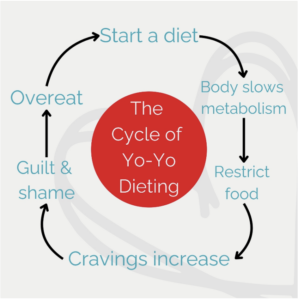If you’ve ever lost weight on a diet, only to regain it—and then some—you’re not alone. The term “yo-yo dieting” describes the cycle of losing weight, regaining it, and starting over, often with increasingly desperate attempts to find the “right” solution.
It’s frustrating, demoralising, and exhausting. Worse yet, it can have long-term effects on both physical and mental health, from slowing your metabolism to damaging your self-esteem. Research from Obesity Reviews (2007) shows that weight cycling is associated with increased fat gain over time, as well as greater risks of cardiovascular disease and type 2 diabetes.
But breaking the yo-yo cycle is possible. It starts with understanding why it happens—and making changes that align with how your brain and body actually work.

Why Yo-Yo Dieting Happens
- Unrealistic Expectations Lead to Burnout
Extreme diets often promote rapid weight loss through restrictive eating, such as cutting out entire food groups or slashing calories. While this might lead to short-term results, it’s unsustainable.
- Your body fights back by slowing your metabolism (Sumithran et al., 2011), making it harder to maintain the weight loss.
- The restrictions are mentally exhausting, increasing your likelihood of abandoning the diet altogether.
- The All-or-Nothing Mentality
Diets are built on rules: “No sugar,” “No carbs,” or “Stay under X calories.” When life inevitably throws challenges your way (a birthday, a stressful day at work), breaking a rule often feels like complete failure.
- This leads to guilt, bingeing, and the idea that you’ll “start again on Monday.”
- Neglecting Habits and Mindset
Diets focus almost entirely on what you eat, ignoring the behaviours, emotions, and habits driving your choices.
- Without addressing triggers (like stress or boredom) or building sustainable habits, the weight is almost guaranteed to come back.
The Emotional Toll of Yo-Yo Dieting
Beyond the physical effects, yo-yo dieting takes a significant toll on your mental health:
- Damaged Self-Esteem: Constantly “failing” at diets reinforces the belief that you’re the problem, not the approach.
- Body Dissatisfaction: A study in Body Image (2018) found that weight cycling is linked to greater body dissatisfaction, regardless of actual weight changes.
- Increased Food Guilt: Restrictive dieting amplifies guilt around eating, creating an unhealthy relationship with food.
The Weight’s Over explores these psychological effects and provides practical strategies to heal your relationship with food.
How to Break the Cycle for Good
Breaking free from yo-yo dieting isn’t about finding the “perfect” diet—it’s about shifting your approach entirely.
1. Let Go of Perfection
Weight loss is not a straight line. Instead of aiming for perfection, focus on progress. Recognise that setbacks are part of the process, not a reason to quit.
- Try This: Reframe slip-ups as learning opportunities. Ask yourself, “What triggered this, and how can I handle it differently next time?”
2. Focus on Sustainable Habits
The key to long-term success isn’t restriction—it’s consistency. Build small, manageable habits that fit into your life.
- Example: Instead of banning all “unhealthy” foods, commit to adding one extra serving of vegetables to your meals each day.
- Research from American Journal of Lifestyle Medicine (2009) shows that small, incremental changes are more likely to be maintained over time.
3. Address Emotional Triggers
Emotional eating is a common driver of yo-yo dieting. Instead of using food to soothe stress or sadness, find alternative ways to manage your emotions.
- Try This: When you feel the urge to eat, pause and ask, “Am I hungry, or am I trying to feel better?” If it’s the latter, consider non-food alternatives like journaling, walking, or talking to a friend.
4. Rebuild Trust with Your Body
Dieting often disconnects us from our natural hunger and fullness cues. Reconnecting with these signals can help you eat more intuitively.
- Try This: Use a hunger scale (from 1–10) before and after meals. Aim to eat when you’re moderately hungry (3–4) and stop when you’re comfortably full (6–7).
5. Shift Your Mindset
Yo-yo dieting often stems from the belief that weight loss is about control. In reality, it’s about collaboration—working with your brain and body instead of against them.
- Mindset shifts like self-compassion, patience, and focusing on overall well-being (not just the scale) can be transformative.
What Does Success Look Like?
Success isn’t about reaching a specific weight or never eating dessert again. It’s about:
- Feeling in control of your food choices, rather than food controlling you.
- Building a relationship with food that’s free from guilt and shame.
- Learning to trust your body and its signals.
How The Weight’s Over will help
If you’ve spent years trapped in the yo-yo dieting cycle, The Weight’s Over – Take back Control offers a way out. This book dives into:
- Why diets fail and how to stop blaming yourself.
- How to build habits that last without restriction or guilt.
- Mindset shifts that help you take back control—for good.
Get your copy at theweightsover.co.uk
Looking for an inspiring story? This one’s so worth a read! Lorraine’s Slimpod experience is truly life-changing—she stopped dieting and lost 11 stone!





